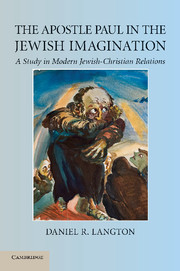Book contents
- Frontmatter
- Contents
- Acknowledgments
- Introduction
- PART I THE APOSTLE PAUL AND POPULAR JEWISH CULTURAL IDENTITY
- PART II THE APOSTLE PAUL AND JEWISH RELIGIOUS IDENTITY: NEW TESTAMENT STUDIES AND THEOLOGICAL APPROACHES
- 2 Constructions of Paul and Interfaith Relations: Building Barriers or Bridges between Judaism and Christianity
- 3 Constructions of Paul in Intra-Jewish Debate: Establishing Jewish Authenticity
- 4 Constructions of Paul as a Dialogical Partner: Transformative Approaches to Jewish Self-Understanding
- PART III THE APOSTLE PAUL AND JEWISH INTEREST IN THE JUDEO-CHRISTIAN TRADITION: ARTISTIC AND LITERARY APPROACHES
- PART IV THE APOSTLE PAUL AND JEWISH CRITIQUES OF THE PLACE OF RELIGION IN SOCIETY: PHILOSOPHICAL AND PSYCHOANALYTICAL APPROACHES
- Conclusion
- Appendix: The Story of Abbu Gulish in The Book of Tales
- Bibliography
- Scripture and Other Ancient Writings Index
- General Index
- References
4 - Constructions of Paul as a Dialogical Partner: Transformative Approaches to Jewish Self-Understanding
Published online by Cambridge University Press: 07 May 2010
- Frontmatter
- Contents
- Acknowledgments
- Introduction
- PART I THE APOSTLE PAUL AND POPULAR JEWISH CULTURAL IDENTITY
- PART II THE APOSTLE PAUL AND JEWISH RELIGIOUS IDENTITY: NEW TESTAMENT STUDIES AND THEOLOGICAL APPROACHES
- 2 Constructions of Paul and Interfaith Relations: Building Barriers or Bridges between Judaism and Christianity
- 3 Constructions of Paul in Intra-Jewish Debate: Establishing Jewish Authenticity
- 4 Constructions of Paul as a Dialogical Partner: Transformative Approaches to Jewish Self-Understanding
- PART III THE APOSTLE PAUL AND JEWISH INTEREST IN THE JUDEO-CHRISTIAN TRADITION: ARTISTIC AND LITERARY APPROACHES
- PART IV THE APOSTLE PAUL AND JEWISH CRITIQUES OF THE PLACE OF RELIGION IN SOCIETY: PHILOSOPHICAL AND PSYCHOANALYTICAL APPROACHES
- Conclusion
- Appendix: The Story of Abbu Gulish in The Book of Tales
- Bibliography
- Scripture and Other Ancient Writings Index
- General Index
- References
Summary
Although it has become something of a cliché to talk of a Jewish obsession with defining what makes one Jewish, with what distinguishes the Jew from the non-Jew, and with where to draw the boundaries, it is no less true for all that. In addition to the dilemma posed by the cacophony of voices claiming to represent authentic Judaism, there is the question of how to navigate a safe path through the vast surrounding Gentile environment that has been so profoundly influenced by Christian thought and culture. Understandably, the characteristic attitude towards the non-Jewish world is often one of ambivalence. A particularly disconcerting discovery for many has been the extent to which non-Jewish worldviews have been internalised, the recognition that many of their attitudes and value-judgements are in fact indistinguishable from those of the unwashed world around them. For some, this discovery has been enough to send them hurrying off to self-imposed ghettos of strict religious observance. For others, it has led to the realisation that the non-Jew is not as alien, not as ‘other’, as they had been taught to believe.
Historically, it could be argued that the ambivalence with which Paul is regarded by Jewish commentators as a group reflects this ambivalence towards non-Jewish culture more generally. As we have seen in the two previous chapters, there is as much uncertainty and suspicion as there is interest in and appreciation of the theological achievements and historical significance of the apostle to the Gentiles.
- Type
- Chapter
- Information
- The Apostle Paul in the Jewish ImaginationA Study in Modern Jewish-Christian Relations, pp. 154 - 174Publisher: Cambridge University PressPrint publication year: 2010



